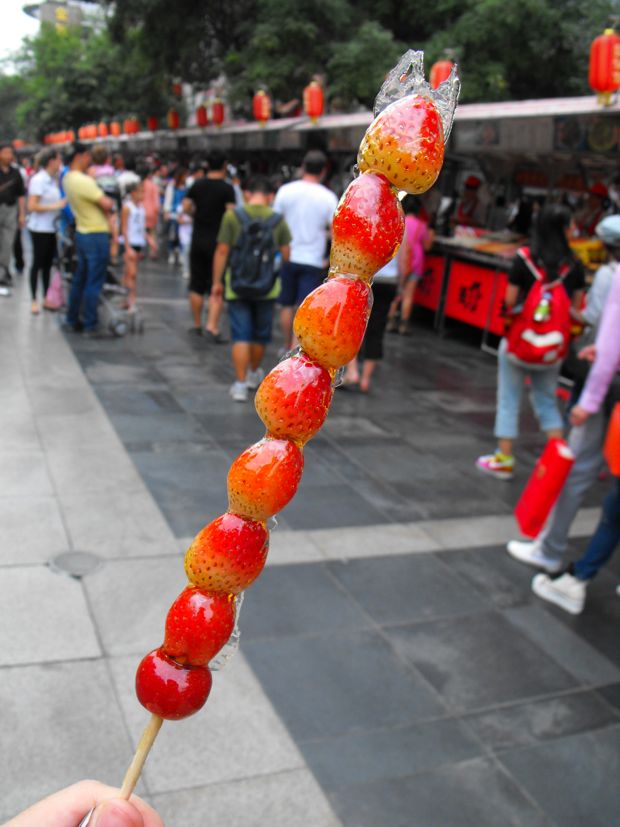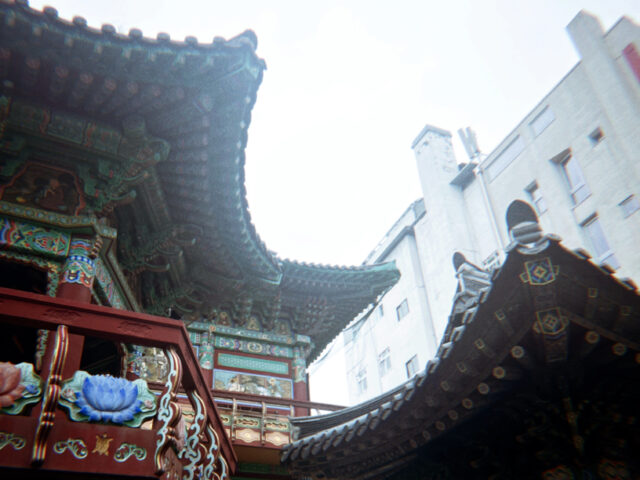One of the indisputably must have experiences while traveling is eating local cuisine. Hands down, nothing but food will let you know a people more intimately. I have noticed that in many places I have traveled how small culinary differences can sometimes unravel an entire cultural outlook on existence, how the customs of eating a dinner can represent the morals of a people just as well sometimes as a moral treatise.
Chinese cuisine is no exception to this rule, and this is why I try to go out and eat different Chinese foods almost every day I live in Beijing.
Beijing’s street food is a must have. Not only is it dirt cheap – you may find yourself spending only 4 kuai, the equivalent of $0.75, on a meal – but it is also an experience, not unlike getting a hot dog in Times Square. On many street corners there are food peddlers showing off their goods to thousands of people each night. There are fried meats on a stick, meat and veggie wraps, 包子bāozi, noodles, candy carts, and much more, from fruit to sweet potatoes and roasted nuts.
My favorite street food is a delectable treat that is a Beijing original: 糖葫芦 tánghúlu. Essentially, all it is are a bunch of fruits on a stick and covered in hot melted sugar and then cooled so that the sugar forms an ice-like casing of sweetness around the fruit. It is like a magical fruit salad that is portable and even better than fruit salad – sorry fruit salad, you know I still love you! I like the strawberry ones the most, but they come in many varieties, including mixtures of kiwi, grapes, pineapple, tomatoes, strawberries, hawthorn, and more.
I also love just roaming around Beijing and looking for small restaurants that most other foreigners are too sketched out by to eat in, aka the genuine Chinese food that most Chinese people actually eat. One such place I found is found in 五道口Wǔdàokǒu is called 成都小吃Chéngdū xiǎochī, literally meaning ‘Chengdu snacks.’ Chengdu is the capital city of 四川Sìchuān province China, a province well known for its spicy flavor. Often while there I order 麻婆豆腐má pó dòufu, a traditional type of spicy tofu, and 宫保鸡丁gōng bǎo jī ding, which is exactly what it sounds like: Kung pao chicken.
In addition to having simply amazing spicy food – I am pretty much in love with Sichuanese food! – this small restaurant also does not cater too much to foreigners, meaning that it gives a more authentic Chinese feel. It is a great place to practice some Chinese – and observe customs. One of my favorite observations is how Chinese men – though it may be more of a Sichuanese custom – drink beer from tall bottles, but they always pour the beer into what is almost a shot glass. It appears to be that throughout history Chinese have never drank from a tall glass, but instead have had a larger container that they pour into smaller cups or bowls. This is mostly founded on how historically Chinese have drunk their tea; they are drinking the beer in a way that is culturally molded by centuries of tea drinking. And their glasses are never empty because if someone drinks theirs another will fill his and then toast him. This is a way for men to enjoy each other and for them to gain ‘face.’
面子miànzi, noun: face; reputation; prestige, etc.
‘Face’ is a cultural concept in China that helps mold social order. It is one’s reputation as a polite individual. The concept is more complicated than I can fully explain here, but in the instance of the man pouring the other man more beer he is showing that he is kind and unselfish. Qualities such as parsimony, fickleness, and ungratefulness hurt one’s ‘face,’ so by sharing beer and encouraging the other to have a good time this man is building his ‘face.’ At the same time, the fact that the other man cheers the one who pours the beer and drinks with him is a way of giving him ‘face;’ if he did not drink the beer he would be harming his friend’s ‘face.’ It is important to work on building one’s own ‘face’ in China, but it is also important to 给面子gěimiànzi, meaning literally to ‘give face.’ This concept runs back far into Chinese history, back to the Confucian concept that life should be well ordered, and people should be respectful of one another. It makes it amazing to see how it is still in practice today, even in a small Sichuanese restaurant down a back alley in modern Beijing. To be part of that is a great privilege I have, and whenever I go to this restaurant with a friend I always make sure to keep his glass filled and his face smiling.
Aaron Records is a student at Colby-Sawyer College and a TEAN Featured Blogger. Aaron is currently studying abroad with TEAN in Beijing, China.










